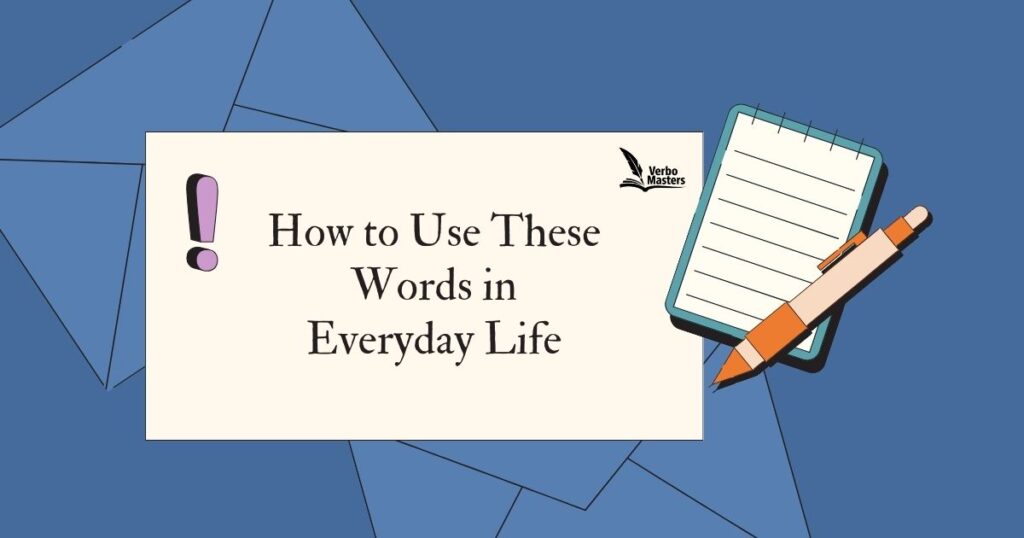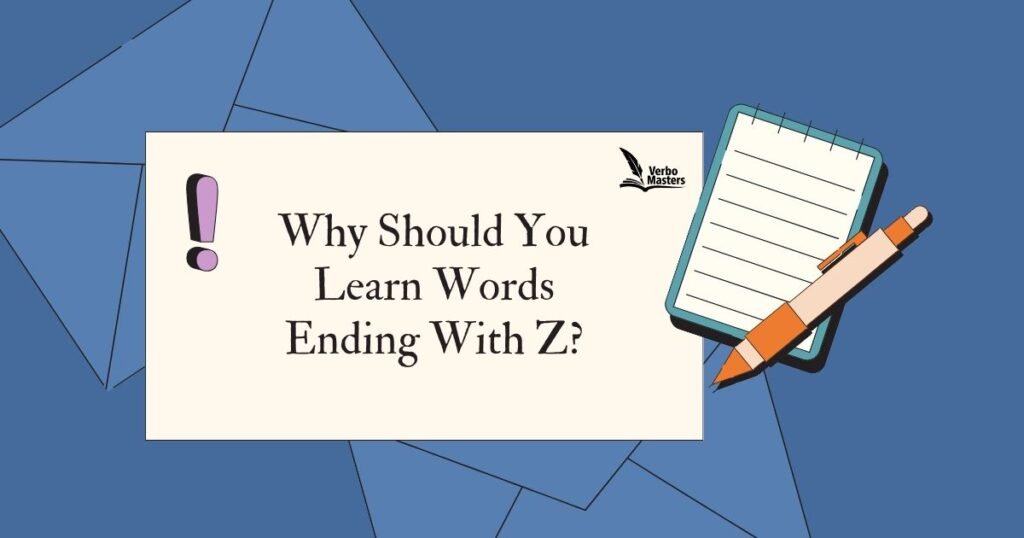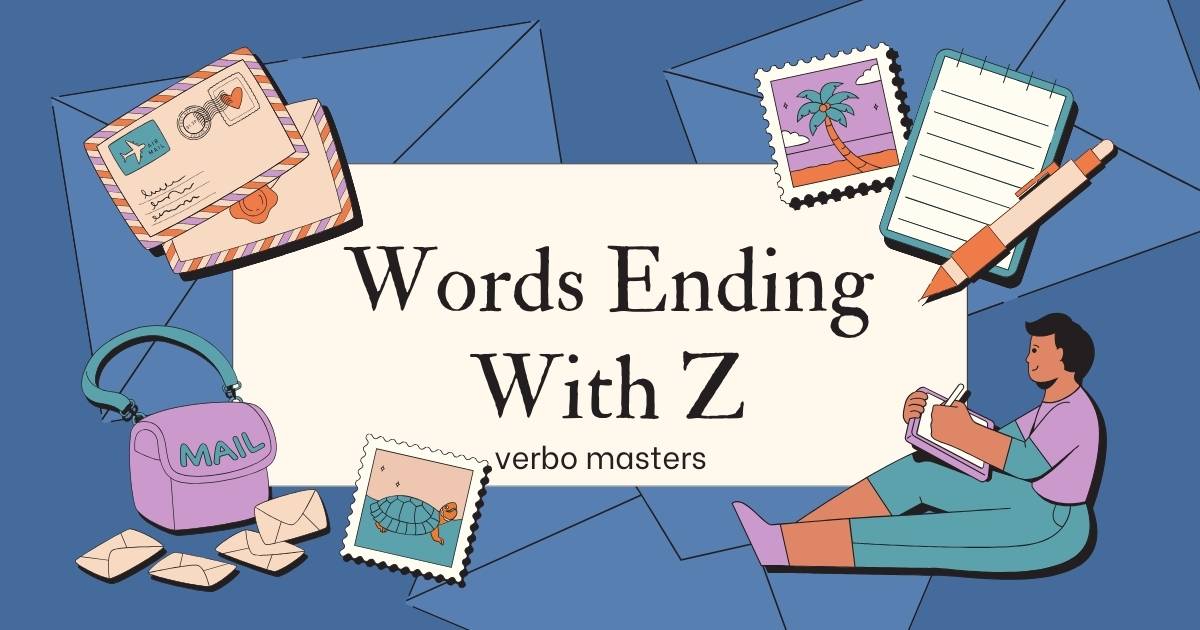Words that end with the letter Z are rare and often unique. These words add a fun twist to the language, making them stand out. Many of them come from foreign languages or are slang terms, offering a distinct flavor to the English vocabulary.
While they aren’t commonly used in everyday speech, they can be interesting to explore. Some of these words are used in specific fields like music or pop culture. Let’s dive into this fun exploration of words that end with the letter Z!
Why Are Words Ending With Z So Unique?
Words that end with the letter Z are rare and stand out in the English language. The letter Z itself is the least used letter in the English alphabet, making words that end in Z” even more unusual and interesting. These words often come from foreign languages and are a fun addition to the vocabulary. Many Z-ending words have an energetic or sharp sound, which gives them a distinctive, lively feel compared to more common word endings. This makes them memorable and fun to use, even if they aren’t often seen in everyday conversation. Their rarity and unique phonetic quality add character to the language, making them fascinating to explore.
Exploring words that end with Z can also introduce you to creative or cultural terms, some of which may even reflect specific industries or trends. These words often emerge in specialized fields such as music, slang, or fashion, where a catchy and sharp sound can help make the term stand out. Whether it’s a jazzy tune or a trendy new word, Z-ending terms bring flair and excitement to the English language. So, let’s dive deeper into some interesting words that end in Z and discover how they contribute to the richness of the language.
Words Ending With Z by Length
Words that end with Z come in various lengths, from short two-letter words to longer multi-syllable terms. The length of a word often influences its usage, and words ending with Z are no exception. Some of these words are common in everyday speech, while others might be more specialized or used in specific contexts. Below, we’ll explore words of different lengths that end with Z and provide examples to help you understand their meaning and usage.
2-Letter Words That End With Z
Finding two-letter words that end with Z is quite rare. However, in slang or shortened forms, there may be instances where this can occur. Most two-letter words in English are functional words like “is” or “an,” and there aren’t many that end with the letter “Z.” This makes the occurrence of Z-ending two-letter words an interesting curiosity in the English language, highlighting the rarity of this particular letter at the end of words.
While there are no standard two-letter words ending in Z” the closest examples are abbreviations or acronyms used in various fields. For instance, “IZ” can be used as an abbreviation for “I’m Zen,” a term in the realm of wellness and mindfulness. However, this usage is more informal and not widely recognized as a standard word.
You can also read; Abbreviation for Police Officer? Definition & Meaning
3-Letter Words That End With Z
Three-letter words ending with Z are more common, especially in slang or informal speech. These words tend to carry a fun, energetic vibe due to their Z ending. Some examples include:
- Biz – Short for business, often used in casual contexts.
- Fiz – A term that refers to the bubbling or hissing sound, often associated with carbonated drinks.
- Jazz – A popular genre of music known for its lively and rhythmic qualities.
- Quiz – A test or examination, commonly used in educational settings.
These three-letter words are familiar in everyday conversation, especially in casual settings. The Z at the end of these words gives them a distinctive sound that makes them stand out from other more common words.
4-Letter Words That End With Z
Four-letter words that end with Z are also not too common but still found in certain contexts. Words like “quiz” and “jazz” are well-known examples. These words are lively, playful, and easy to remember, which is why they are often used in informal speech and writing.
- Quiz – A short, often informal test used to assess knowledge.
- Jazz – A genre of music that features improvisation and rhythmic syncopation.
- Fuzz – A term used to describe a soft, light texture or a term for police officers (slang).
- Waltz – A smooth, formal dance in triple meter.
These four-letter words are more commonly used and are versatile in various contexts. They can describe everything from music genres to informal tests, giving them a wide range of applications.
5-Letter Words That End With Z
Five-letter words that end in Z are rare, but some stand out for their distinctiveness and creative use. Words like “fuzz” and “blitz” show how Z can add an energetic punch to a word. These words are often used in sports, slang, or music, where a sharp ending adds flair to the term.
- Fuzz – A slang term for the police or referring to a soft texture.
- Blitz – A fast and intense attack, often used in military or sports contexts.
- Jazz – A music genre known for its lively, improvisational style.
- Fritz – A term meaning something is broken or malfunctioning, often used informally.
The addition of Z at the end of these five-letter words gives them a sharp, bold tone, making them fun and easy to remember. These words are versatile and can be used in a variety of situations.
6-Letter Words That End With Z
Six-letter words that end with Z are less common but still add an interesting touch to language. Words like “frozen” and “razz” fit this category. These words are often used in specific fields like culinary arts or entertainment, adding flavor to conversations within those contexts.
- Frozen – Refers to something that has been turned into ice, commonly used in food or environmental contexts.
- Razz – A playful term meaning to tease or make fun of someone, often in a friendly manner.
- Topaz – A precious gemstone, known for its variety of colors and brilliance.
These words are typically more specialized, and while they might not be as common in daily speech, they are still valuable and useful when discussing specific topics.
7-Letter Words That End With Z
Seven-letter words that end in Z are even more rare, but some still appear in certain contexts, such as names or technical terms. Examples include:
- Topaz – A precious gemstone that comes in various colors.
- Waltz – A ballroom dance that is performed in triple meter.
- Fritz – A slang term meaning something has stopped working or malfunctioned.
These words are often used in specialized settings, such as in jewelry or dancing, and their Z endings give them a distinguished and memorable quality.
8-Letter Words That End With Z
Words with eight letters ending in Z are quite rare, and most of them are specific to particular cultural or niche contexts. They often have a strong, impactful sound, and their usage is typically reserved for unique scenarios.
- Fritz – A term used to indicate malfunction, often used informally.
- Cogniz – A term related to awareness or knowledge, used in legal or technical contexts.
- Schnitz – A word used in culinary contexts, typically referring to a thin slice or cut of meat.
These words tend to be more specialized, found in specific areas such as food, law, or technology.
9-Letter Words That End with Z
Nine-letter words ending in Z are quite rare in the English language. They typically appear in specific technical or academic contexts. Examples might include scientific terms or coined words used for particular purposes.
10-Letter Words That End with Z
Ten-letter words ending with Z are extremely uncommon in everyday English, and these words often come from specialized or technical fields. Their length, combined with the rare ending, makes them fascinating and somewhat challenging to use. Some of these words may appear in specific industries, scientific terms, or even brand names that are meant to stand out because of their unique and bold sound. While they are rare, they serve as excellent examples of how the letter Z can add character to longer words.
- Franchisez – A rare variant or creative use of the word “franchise,” often used in marketing or business contexts.
- Standardiz – A term related to making something standard, often used in technical or quality control fields.
- Neutraliz – A term used in science or chemistry, particularly when discussing the process of neutralizing an acid or base.
Due to their rarity, ten-letter words ending in Z are often found in more technical, business, or scientific contexts. They are unlikely to be encountered frequently in casual conversation but can still add a unique touch to specific dialogues.
11-Letter Words That End with Z
Eleven-letter words that end with Z are even rarer and typically appear in specialized vocabulary, often as part of scientific nomenclature, industry jargon, or coined terms in specific fields. The structure of these long words makes them difficult to use in everyday communication, but they are still important in the context where they are applicable.
- Advertizement – A longer form of the word “advertisement,” commonly used in marketing or media industries.
- Universaliz – A term that refers to making something applicable or relevant universally.
- Fantasizize – A creative or playful term that refers to imagining or daydreaming about something, often used informally.
These words demonstrate the adaptability of the letter Z in longer forms, often lending a sense of authority or creativity to technical, marketing, or scientific fields.
12-Letter Words That End with Z
As we move into the realm of twelve-letter words, it becomes increasingly difficult to find examples that end with “Z.” When they do exist, these words are highly specialized and used mostly in technical, scholarly, or niche areas. Despite their length, they manage to maintain a sense of elegance due to the sharp, striking sound of the “Z.”
- Centralizizez – A variation or creative form of the word “centralize,” commonly used in organizational contexts.
- Deodorizize – A rare term associated with the process of deodorizing something, particularly used in chemical or manufacturing industries.
The twelve-letter words ending in Z are more theoretical and less commonly used in standard conversation. They are more likely to appear in academic papers, industry-specific jargon, or when discussing specific processes.
13-Letter Words That End with Z
Thirteen-letter words that end in Z are extremely rare and are typically seen in highly specialized fields. These words often combine elements of innovation or highly technical language. Given their rarity, they are mostly reserved for fields like science, law, or technology. Their length and unique ending make them stand out when used in formal writing or professional communication.
- Uncompromiziz – A coined term for a process where compromise is impossible, often used in legal or philosophical contexts.
- Superorganiziz – Refers to a highly organized structure, often used in discussions of complex systems or ecosystems.
Words of this length ending in Z are practically nonexistent in casual speech but may appear in scholarly works or conceptual writing. Their uncommon nature makes them highly specialized and intriguing in their respective contexts.
How to Use These Words in Everyday Life

Words ending with Z can add flair and uniqueness to your speech or writing, but their use in everyday language depends on context. Most of the words we have explored tend to be informal, fun, or borrowed from other languages. Some, like “jazz” or “quiz,” are commonly used in casual conversation, while others may appear more often in specialized areas like science or technology. When you do use these words, it’s important to make sure they fit the tone and purpose of your conversation.
For instance, if you’re discussing a musical event, words like “jazz” or “fizz” may come up easily. Meanwhile, terms like “quiz” or “blitz” might be more useful in educational or competitive contexts. Using words that end with Z” can make your communication more lively and memorable, but it’s essential to know when and where to use them to avoid sounding forced or out of place. While they add vibrancy to language, their rarity makes them feel special when used correctly.
Fun Facts About Words Ending With Z
Words that end with Z are not just unusual in their form—they come with their own interesting history. Did you know that many words with this ending have origins in other languages, particularly German and Italian? The distinctiveness of the Z sound gives these words an energetic feel. This is one reason they are often used in music and entertainment. In fact, many popular music genres, like jazz, take advantage of the Z sound to make them memorable and exciting.
Another fun fact is that some of these words have been adopted into English slang. For example, “fizz” has become associated with effervescence, not just in drinks but also as a term for something lively and bubbly. Words with Z endings can give your speech or writing a playful and dynamic edge. Whether in pop culture, music, or daily conversations, these words are a fun way to express creativity.
Why Should You Learn Words Ending With Z?

Learning words that end with Z can be an exciting and valuable exercise for anyone looking to expand their vocabulary. These unique words help add diversity and creativity to both spoken and written communication. Whether you’re a writer looking for more interesting terms, a student expanding your vocabulary, or someone who simply loves words, exploring these Z words can enhance your language skills. They also allow you to stand out and make your expressions more memorable.
In addition to enhancing your vocabulary, learning words with such distinctive endings can help improve your linguistic versatility. The Z sound often carries energy and emphasis, making words with this ending useful for drawing attention to specific points. It’s a fun way to enrich your language and start using uncommon words that make conversations or writing more engaging. So, if you want to boost your vocabulary with some zing, words that end with Z are a great place to start.
Tips for Remembering Words Ending With Z
When it comes to remembering words that end with Z,” there are a few tricks you can use to make them stick. First, try associating the words with something visual or auditory. For example, the word “jazz” can bring to mind an image of a lively music scene, while “buzz” can remind you of the sound a bee makes. These associations will help anchor the words in your memory, making them easier to recall later.
Another helpful tip is to group words with similar sounds together. Words that share the Z ending, like “quiz,” “fizz,” and “blitz,” can be learned as a set. Using them in context, such as by writing sentences or incorporating them into your daily conversations, will also make them more familiar. With regular practice, these words will gradually become a part of your active vocabulary. Keep practicing, and soon you’ll be using them with ease.
FAQs
What are words that end with Z?
Words ending with Z are uncommon but can add a distinctive touch to language. These words, such as “jazz,” “buzz,” or “quiz,” can often be found in music, slang, or specific fields like science and business.
Why are words ending with Z so rare?
Words ending in Z are less common in English due to the language’s historical roots. The Z sound itself is relatively rare, and words with this ending are usually borrowed from other languages, such as German or Italian.
How can I use words ending with Z in conversation?
Words ending with Z can be used in informal or creative contexts. They are perfect for casual conversations, storytelling, or when you want to add emphasis or excitement, like “jazzing up” a situation or saying “buzz off.”
Are there any synonyms for words ending with Z?
Some synonyms for words like “buzz,” “quiz,” or “jazz” might include alternatives like “hum,” “test,” or “music.” These synonyms vary based on the context in which the Z word is used.
What are the most common words ending with Z?
Common words that end with Z include “buzz,” “jazz,” “quiz,” and “fizz.” These words are frequently used in everyday language, especially in informal contexts like casual conversations, music, and games.
Are words ending with Z used in formal language?
While words like “jazz” or “quiz” might appear in more casual or informal settings, they aren’t typically used in highly formal language. However, in certain industries, like branding or marketing, words ending with Z can be used to add a bold, catchy flair.
Can you give examples of longer words ending with Z?
Examples of longer words with Z include “standardiz” (to make standard) or “neutraliz” (to neutralize). These words are often used in technical or scientific contexts, especially when discussing processes.
What is the history behind words ending with Z?
Many words ending with Z have origins in other languages, particularly Germanic or Romance languages. Over time, these words have been adapted into English, where they’ve been either slightly modified or kept intact, retaining their unique Z endings.
How can I remember words that end with Z?
One way to remember these words is by associating them with familiar sounds or concepts. For example, “jazz” might remind you of lively music, while “buzz” brings to mind the sound of bees. Grouping these words into thematic categories can also help you remember them better.
Are words ending with Z popular in other languages?
Yes, words ending with Z are more common in some other languages, like German and Spanish, and have often been adopted into English. Words such as “blitz” (German for “lightning”) and “quiz” (originating in the early 19th century) showcase this trend.
Conclusion
Exploring words that end with Z can add a unique flair to your vocabulary, enriching your ability to communicate effectively. From casual words like “jazz” and “quiz” to rare and complex terms, these words have a way of catching attention and making statements more memorable. Whether you’re writing creatively, engaging in a conversation, or simply expanding your word knowledge, Z words are a fun and effective way to express yourself.
As you continue learning, don’t hesitate to experiment with these words. Try them in various contexts, and before long, you’ll be adding a bit of extra “zi

I’m John Smith, a language enthusiast dedicated to helping writers, students, and professionals master the art of clear and effective communication. Whether you’re looking for grammar tips, writing guides, or common mistake corrections, you’ll find valuable insights to improve your language skills. Let’s make grammar simple and fun!

